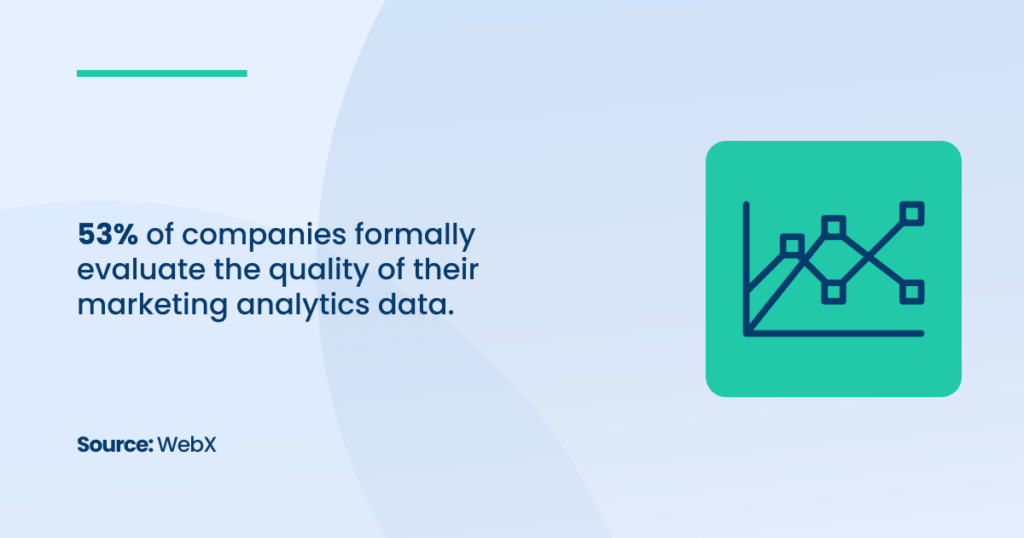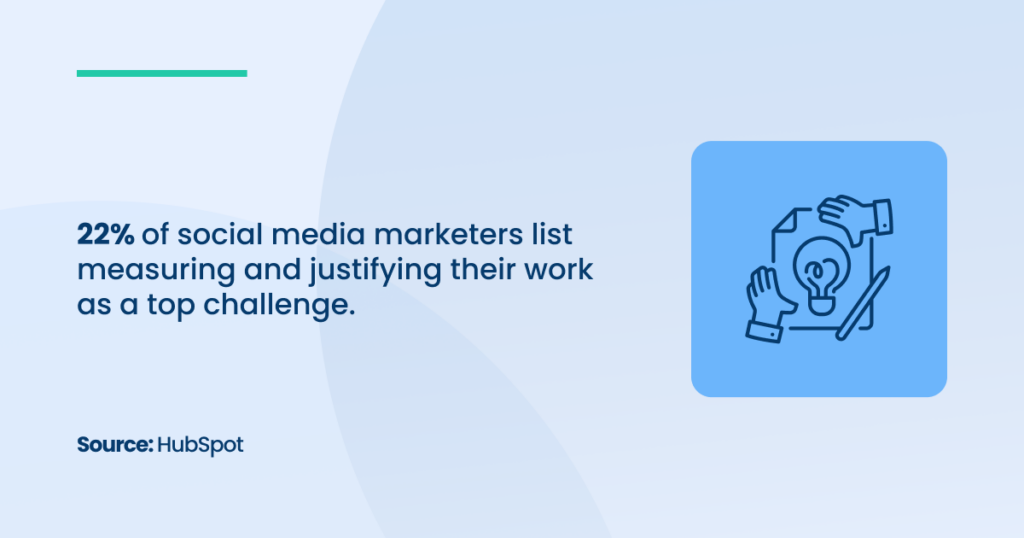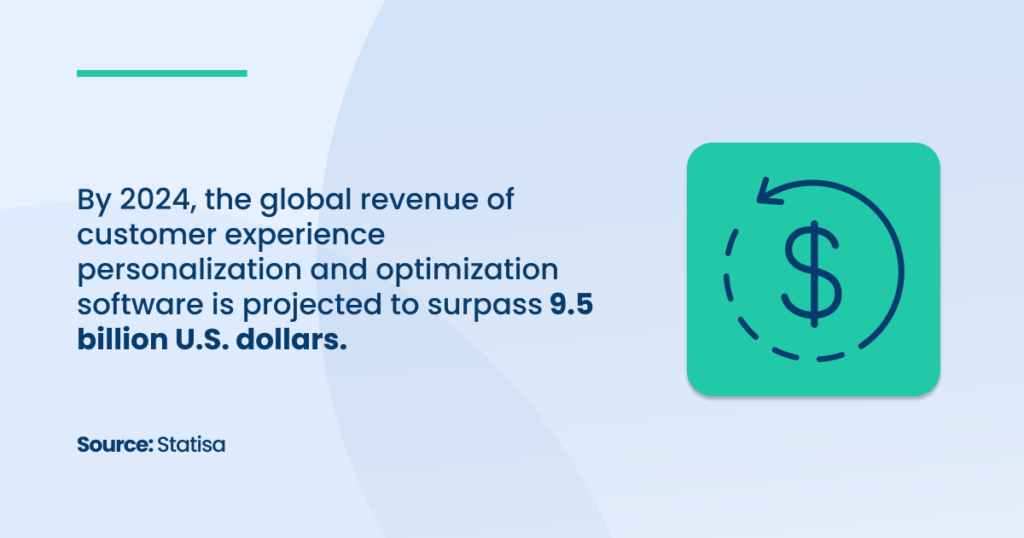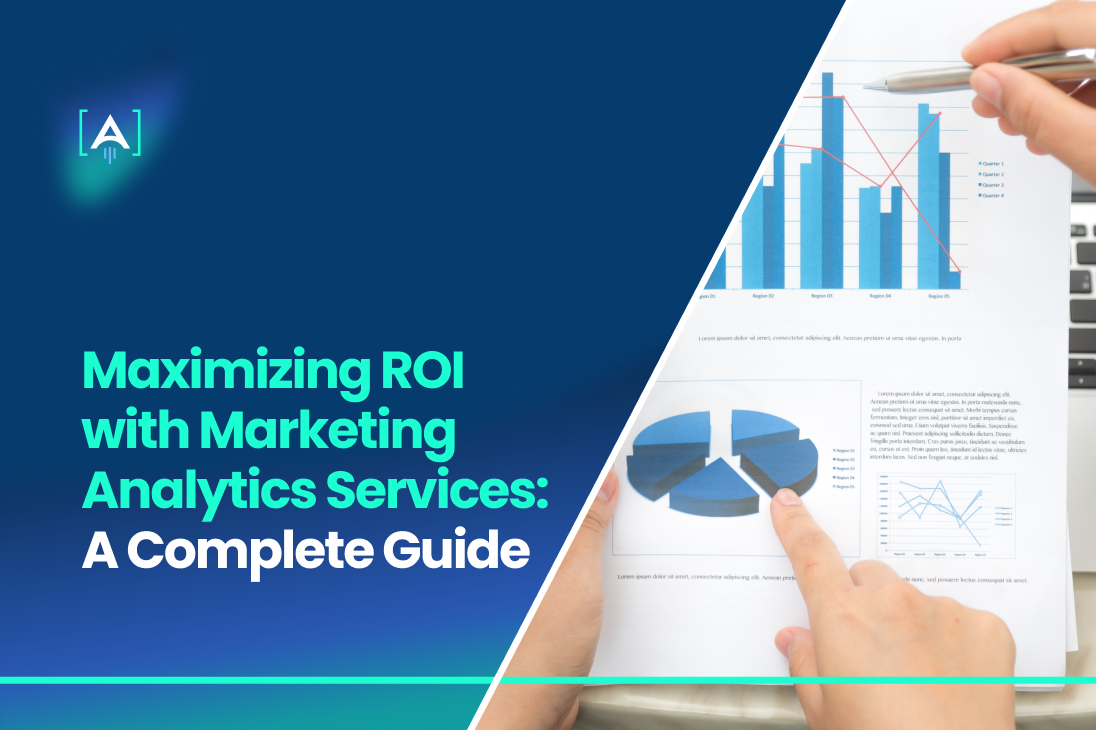Understanding your target audience and measuring the effectiveness of your marketing efforts is essential for success.
Enter marketing analytics services, a powerful tool that can transform raw data into actionable insights.
By leveraging these services, businesses can optimize their marketing strategies, maximize return on investment (ROI), and achieve sustainable growth.
87% of marketers report that data is their company’s most under-utilized asset.

Moreover, the source notes that 53% of marketing decisions are influenced by marketing analytics.
Accordingly, harnessing the power of data and making informed decisions that drive significant ROI can be achievable with a quality Marketing Analytics & Reporting Agency.
The blog will cover marketing analytics services that maximize ROI.
What Are Marketing Analytics Services?
Marketing analytics services are specialized tools and solutions that help businesses track, analyze, and optimize their marketing efforts using data.

At the core of marketing analytics services is the collection and analysis of marketing data.
This data comes from multiple channels, including social media platforms, websites, email campaigns, and more.
For example, tools like Google Analytics provide insights into user behavior, showing how customers interact with a website, which pages they visit, and where they drop off.
By analyzing this data, businesses can make informed decisions regarding their marketing campaigns.
For instance, data can show which marketing channels are driving the most conversions, allowing marketers to allocate budgets more efficiently.
Moreover, marketing analytics services can track specific marketing campaign metrics, such as cost per acquisition (CPA), click-through rates (CTR), and conversion rates, which are critical for understanding the overall performance of a campaign.
Why Are Marketing Analytics Services Important for ROI?
Real-Time Campaign Monitoring: Marketing analytics services enable businesses to track the performance of their marketing campaigns in real time, offering actionable insights to optimize marketing budgets and improve results.
Optimizing Key Marketing Metrics:
- Helps businesses optimize critical marketing campaign metrics such as:
- Conversion rates
- Customer lifetime value (CLV)
- Return on ad spend (ROAS)
- These metrics provide a clear understanding of campaign effectiveness and where improvements can be made.
Resource Allocation: By identifying campaigns with the highest ROAS, businesses can shift resources to more profitable efforts, ensuring every marketing dollar is spent effectively.
Audience Refinement and Personalization:
- Data analytics in business allows for better audience segmentation.
- Enables personalized marketing efforts based on customer behavior, preferences, and purchase patterns, driving higher engagement and improving ROI.
Customer Journey Tracking:
- Tools like Google Analytics track how customers move through the sales funnel, from first contact to final purchase.
- Identifies bottlenecks and friction points in the customer journey, enabling marketers to streamline the process and boost conversion rates.
Identifying Wasted Spend:
- Marketing analytics services highlight channels and strategies that aren’t delivering results.
- Businesses can cut ineffective marketing activities and focus on those with the most significant returns, leading to more efficient resource use and a higher ROI.
Data-Driven Decision Making:
- Leverages marketing data from multiple channels to make smarter, data-driven decisions.
- Improves overall marketing outcomes by targeting the right audience, optimizing campaigns, and refining the customer journey.
Key Components of Effective Marketing Analytics
By understanding and optimizing their marketing efforts through data analytics in business, companies can gain a competitive edge.
The key components of marketing analytics, from data collection to performance metrics, enable businesses to make informed decisions, streamline operations, and enhance the ROI of their digital marketing campaigns.
Data Collection and Integration
A fundamental aspect of marketing analytics services is collecting and integrating data from various sources.
The global big data market is forecasted to grow to 103 billion U.S. dollars by 2027.
Source: Areas in which data-driven marketing was currently the most useful, Statista
The ability to gather relevant information is essential for making informed decisions about advertising campaigns and improving the overall marketing performance.
Sources of Marketing Data (CRM, Social, Website)
Marketing data comes from numerous sources, each providing valuable insights into different aspects of a company’s marketing efforts.
A CRM system is a rich source of customer-related data, tracking interactions with leads and customers throughout the entire sales process.
The data collected from CRM systems is valuable for understanding customer behavior, preferences, and purchase patterns.
Social media platforms also play a significant role in providing influencer marketing analytics, audience engagement data, and social listening insights.
The conversations, comments, and interactions on platforms like Facebook, Instagram, and Twitter can give businesses a clearer understanding of public sentiment, enabling them to tailor their advertising campaigns more effectively.
Source: Most popular social networks worldwide as of April 2024, Statista
Integrating Multiple Data Channels for Complete Insights
To maximize the value of marketing analytics services, businesses must integrate data from multiple channels.
By combining insights from CRM systems, social media platforms, and websites, companies can create a more comprehensive picture of their marketing efforts.
The challenge lies in ensuring that all this data works together to provide actionable insights.
Using marketing analytics consulting services can assist in overcoming the difficulties of data integration.
These consulting services help companies integrate data from multiple sources, analyze it effectively, and draw valuable conclusions that can guide future digital marketing campaigns.
By integrating multiple data channels, companies can avoid the pitfalls of siloed information and get a complete view of their marketing strategy’s effectiveness.
Analyzing Customer Behavior
Once the data has been collected and integrated, the next step in effective marketing analytics solutions is to analyze customer behavior.
Understanding how customers engage with marketing efforts is crucial for optimizing strategies and improving the ROI of advertising campaigns.
Customer Journey Mapping
Customer journey mapping is a critical tool for analyzing customer behavior. This technique involves charting the path a customer takes from the initial point of contact to the final conversion.
Through this method, businesses can identify the key touchpoints where customers interact with their brand and evaluate the effectiveness of each stage in the journey.
The data from digital marketing channels such as email, social media, and websites feed into the customer journey map, revealing important insights into how customers interact with the brand at different stages.
AI marketing analytics tools can enhance customer journey mapping by automating the process and providing real-time insights into customer behavior patterns.
By leveraging these tools, businesses can quickly identify bottlenecks or pain points in the customer journey and adjust their strategies accordingly.
Identifying Key Touchpoints and Conversions
Identifying key touchpoints and conversions is another essential aspect of marketing analytics services.
Touchpoints are the moments where customers engage with a brand, such as clicking on a social media ad, opening an email, or visiting a website.
Conversions, on the other hand, are the actions customers take that contribute directly to a company’s goals, such as making a purchase or signing up for a newsletter.
Source: Average Conversion rate by Industry, Invespcro
Understanding which touchpoints lead to conversions is vital for optimizing advertising campaigns.
By analyzing customer behavior, businesses can focus their efforts on the touchpoints that drive the most value.
For example, if social media ads lead to more conversions than email campaigns, businesses can adjust their digital marketing strategies accordingly.
Influencer marketing analytics is also key to this process, allowing businesses to track the effectiveness of campaigns involving social media influencers.
Performance Metrics to Focus On
The final component of effective marketing analytics services is tracking and optimizing performance metrics.
Metrics offer businesses concrete data to measure the success of their marketing campaigns and determine where improvements are needed.
Metrics That Impact ROI (CPC, CPA, ROAS)
Several key metrics directly impact a company’s ROI, and understanding these metrics is critical for optimizing digital marketing campaigns.
- Cost per click (CPC) measures the cost of each click in a paid advertising campaign, giving businesses insight into how much they are paying to attract website visitors. Lowering CPC without sacrificing the quality of traffic can significantly improve the ROI of a campaign.
- Cost per acquisition (CPA) is another essential metric, as it shows the cost of acquiring a new customer through marketing efforts. By optimizing CPA, businesses can ensure that they are getting the most value out of their marketing spend.
- Return on ad spend (ROAS) is perhaps the most important metric for measuring marketing success. ROAS measures how much revenue a company earns for every dollar spent on advertising. A high ROAS indicates that a company’s marketing efforts are generating significant revenue, while a low ROAS suggests that adjustments may be needed to improve campaign effectiveness.
How to Use KPIs for Effective Campaign Management
Key performance indicators (KPIs) are essential for managing marketing campaigns effectively. KPIs are specific, measurable goals that businesses use to track the success of their marketing efforts.
In marketing analytics consulting, experts help companies define relevant KPIs that align with their overall business objectives.
To use KPIs effectively, businesses must first determine which metrics matter most to their goals.
For example, if the primary goal of a campaign is to increase sales, KPIs such as conversion rate and ROAS will be the most relevant. If the goal is to increase brand awareness, metrics such as website traffic and social media engagement may take precedence.
How Marketing Analytics Boosts ROI
Marketing analytics services are essential for businesses aiming to optimize their marketing efforts and maximize return on investment (ROI). By leveraging data insights from various channels, businesses can make informed decisions that directly impact the effectiveness of their marketing campaigns.
Whether through personalized customer targeting or more strategic budget allocation, marketing analytics allows companies to stay ahead in a competitive market.
With the rise of mobile marketing analytics, web marketing analytics, and social media marketing analytics, businesses are now better equipped to understand their audience, measure campaign performance, and refine their strategies for higher ROI.
Personalized Marketing and Customer Segmentation
Personalization has become a cornerstone of modern marketing. Customers now expect tailored experiences, and businesses that can deliver these personalized touches are more likely to foster customer loyalty and improve conversion rates.

Marketing analytics services help businesses understand their audience at a granular level, enabling more precise targeting and improved customer segmentation.
Using Analytics for Precise Targeting
Marketing data insights allow companies to segment their audiences based on various criteria, such as demographics, interests, and online behavior.
Web marketing analytics, for instance, can track user interactions on a website, helping businesses understand which products or services resonate most with specific audience segments.
By analyzing this data, companies can deliver more relevant ads and content to each segment, thereby increasing engagement and conversions.
Similarly, mobile marketing analytics provides valuable insights into how users interact with mobile apps and websites.
Businesses can use this data to create targeted push notifications or SMS campaigns, ensuring that their messaging reaches the right audience at the right time.
Precise targeting through marketing analytics services not only improves customer experience but also boosts the overall effectiveness of marketing efforts.
SEO marketing analytics further refines targeting by providing insights into which keywords drive the most traffic and conversions.
With this information, businesses can optimize their content to attract high-intent users, ensuring their marketing strategies align with customer search behaviors.
By leveraging SEO insights, companies can better position themselves in search engine results and drive more qualified leads to their websites.
Leveraging Predictive Analytics for Higher Conversions
Predictive analytics is a powerful tool for boosting marketing ROI. By analyzing historical data, businesses can predict future customer behavior and preferences, allowing them to create more effective campaigns.
Leveraging data from past campaigns enables companies to forecast which types of offers, messages, or products are likely to convert a particular segment of their audience.
For example, a business might use social media marketing analytics to identify patterns in customer engagement and predict when certain user groups are most likely to make a purchase.
This can help marketers design campaigns that align with these patterns, increasing the likelihood of conversions.
Predictive analytics also enables businesses to identify potential churn risks, allowing them to proactively address customer dissatisfaction and increase retention rates.
By incorporating predictive models into their marketing analytics services, businesses can significantly improve the accuracy of their targeting and conversion efforts, leading to higher ROI over time.
Optimizing Marketing Budgets
Efficient budget allocation is one of the most critical aspects of maximizing ROI. With an ever-growing number of digital marketing channels to choose from, it can be challenging to decide where to invest marketing dollars.
This is where marketing analytics services come into play.
By analyzing performance data from past campaigns, businesses can allocate their budgets more strategically, ensuring that resources are spent on the channels and tactics that drive the best results.
Data-Driven Decision Making for Budget Allocation
Marketing analytics services allow businesses to make data-driven decisions when allocating their marketing budgets.
By analyzing performance metrics such as click-through rates (CTR), cost per acquisition (CPA), and return on ad spend (ROAS), companies can determine which channels and campaigns offer the highest ROI.
Source: HubSpot
For example, a business might discover that Google Ads campaigns generate significantly more conversions than display ads on social media, prompting them to invest more heavily in search-based advertising.
Furthermore, marketing analytics trends can highlight shifts in customer behavior or emerging platforms, helping businesses stay ahead of the curve.
If social media marketing analytics shows that a specific platform is gaining popularity among a target demographic, businesses can adjust their budget to capitalize on this trend.
Similarly, mobile marketing analytics can reveal that a growing portion of the audience is engaging with content via mobile devices, prompting businesses to increase their investment in mobile-optimized advertising.
Reducing Wasted Ad Spend with Predictive Modeling
Wasted ad spend is a common issue for businesses running digital marketing campaigns, but predictive modeling can help mitigate this problem.
By analyzing historical campaign data, businesses can identify which ads and channels are underperforming and make informed adjustments to avoid wasting money on ineffective tactics.
Ad spending in the Digital Advertising market is projected to reach US$740.3bn in 2024.
Source: HubSpot
Predictive modeling also helps businesses anticipate which audience segments are most likely to respond to specific campaigns, allowing them to focus their efforts on high-value prospects.
Partner with [A] Growth Agency for Marketing Analytics and Reporting Approaches and Strategies
As technology continues to evolve, the capabilities of marketing analytics and reporting will only expand. Businesses seek to optimize their strategies and achieve sustainable growth.
[A] Growth Agency will provide the expertise and resources to help them achieve these goals.
Our professionals specialize in turning entrepreneurial dreams into reality with effective, tailored growth strategies.
Excellence is our standard. We cultivate a team of ‘A players’ – top-tier talents who bring passion and expertise to every challenge.
We believe that a strong team is the foundation of success, and we invest in our people to ensure they are equipped with the latest tools and knowledge to drive growth.
If you want to learn more about our strategies, what should you do?

